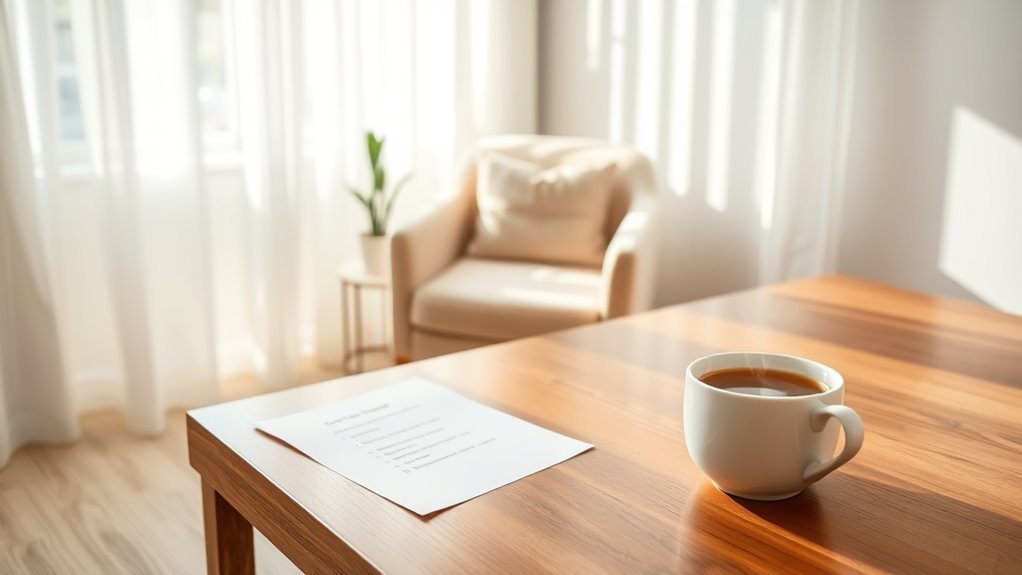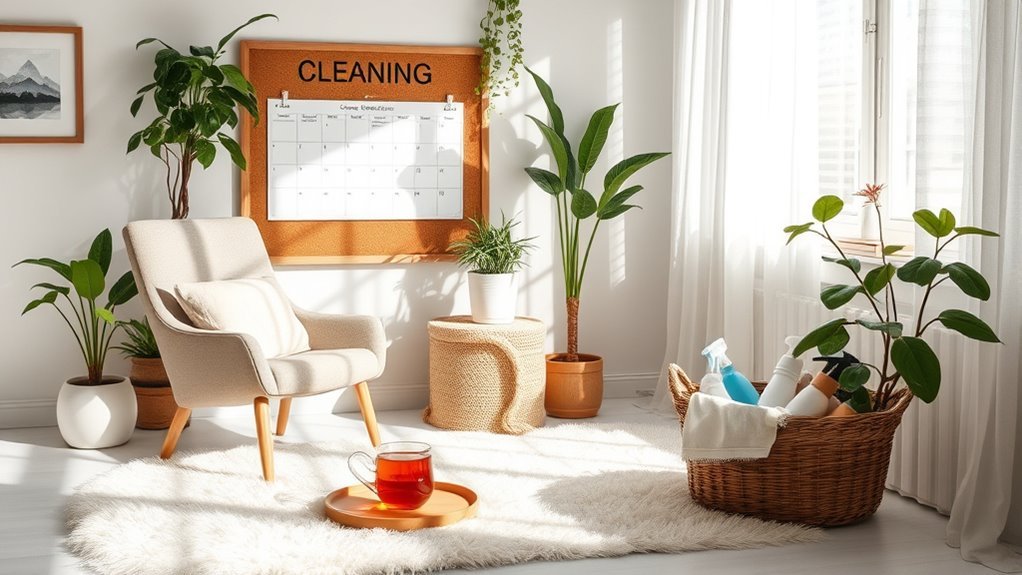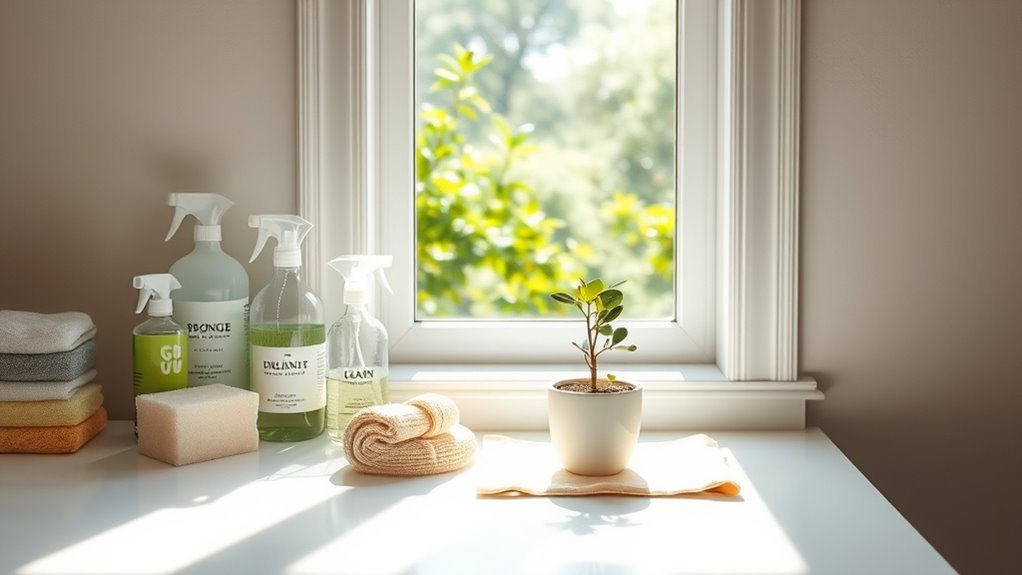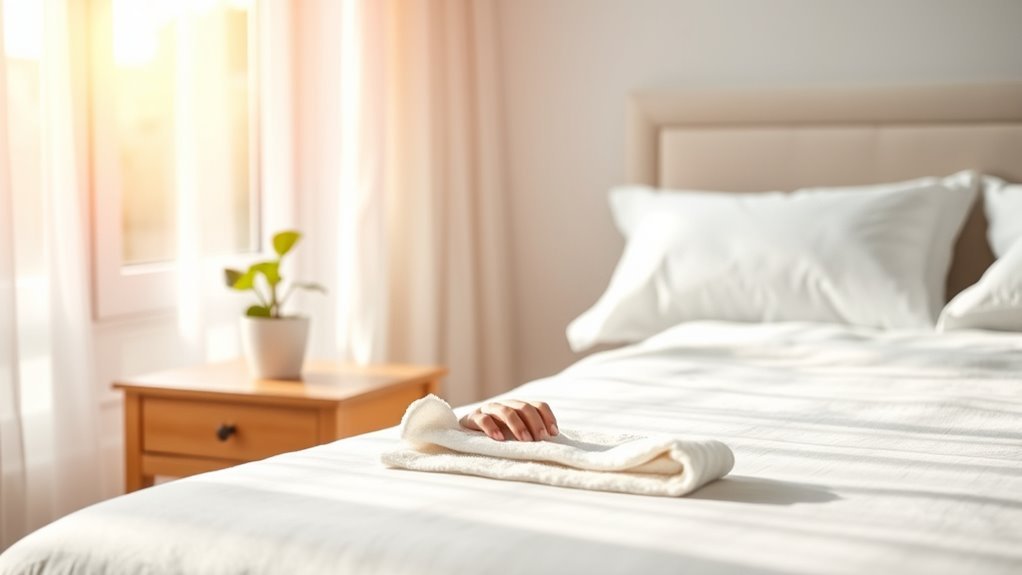Tips for Cleaning to Support Mental Health
You can boost your mental health by setting realistic cleaning goals and breaking tasks into small, manageable steps to avoid feeling overwhelmed. Try focusing on one area at a time and use cleaning as a mindful activity, engaging your senses and breathing deeply. Decluttering regularly helps clear both your space and mind. Celebrate small wins and practice self-compassion to keep motivation up. With the right approach, cleaning becomes a tool for calm and clarity. There’s more to explore on making cleaning work for you.
Set Realistic Cleaning Goals

Although it’s tempting to tackle your entire home at once, setting realistic cleaning goals makes the process less overwhelming and more manageable. When you set achievable targets, you protect your cleaning motivation from burnout and frustration. It’s easy to lose momentum if you expect perfection immediately, so keeping your expectations realistic helps you stay on track. Remember, the goal isn’t to create a spotless home overnight but to build habits that support your mental freedom. By focusing on smaller, attainable goals, you’ll feel a sense of accomplishment that fuels your desire to keep going. Embrace progress over perfection, and you’ll find cleaning becomes a tool for mental clarity rather than a burden. This mindset shift empowers you to enjoy both a cleaner space and a freer mind.
Break Tasks Into Small Steps
You can make cleaning less overwhelming by breaking tasks into small, manageable steps. Focus on chores that feel doable and set realistic goals for each session. Don’t forget to celebrate your progress, no matter how small—it helps keep your motivation up.
Prioritize Manageable Chores
Breaking down your cleaning into small, manageable steps can make a huge difference in how you feel about tackling chores. When you prioritize manageable chores, you create cleaning rituals that boost your chore motivation and give you a sense of freedom rather than overwhelm. Focus on tasks you can complete quickly to build momentum.
| Task | Time Needed |
|---|---|
| Wiping kitchen counters | 5 minutes |
| Clearing dining table | 7 minutes |
| Sweeping living room | 10 minutes |
| Organizing shoes | 8 minutes |
Set Realistic Goals
When cleaning feels overwhelming, setting realistic goals can make the process much easier to handle. Instead of aiming to clean the entire house in one go, break tasks into small steps. For example, focus on clearing one countertop or organizing a single drawer. This approach keeps cleaning motivation alive because each small goal is achievable, preventing burnout. Goal setting like this gives you the freedom to progress at your own pace without pressure. You’ll find that accomplishing these bite-sized tasks builds momentum, making the overall job feel less intimidating. By setting clear, manageable goals, you take control of your environment and your mental well-being, creating space to breathe while still making meaningful progress.
Celebrate Small Wins
Although tackling cleaning bit by bit can seem slow, celebrating small wins keeps your motivation strong. Breaking tasks into manageable steps lets you build momentum without feeling overwhelmed. Each time you complete a small part of your cleaning rituals, take a moment to acknowledge your progress. Use positive affirmations like “I’m making my space my own” to reinforce your efforts and boost your mood. These little victories add up, creating a sense of freedom and control over your environment. Instead of aiming for perfection all at once, embracing small achievements helps you stay consistent and reduces stress. Remember, your cleaning journey is about supporting your mental health, so honor every step you take toward a clearer, calmer space.
Use Cleaning as a Mindful Activity
When you clean, try to focus fully on the present moment and engage all your senses. Move slowly and deliberately, noticing the textures, smells, and sounds around you. This mindful approach can help calm your mind and reduce stress.
Focus on Present Moment
Since your mind often wanders during daily tasks, using cleaning as a mindful activity can help you stay grounded in the present moment. By applying mindfulness techniques, you can transform cleaning from a chore into an opportunity for present awareness. Focus fully on each movement, the sensation of wiping surfaces, or the rhythm of sweeping. This conscious attention frees you from distracting thoughts about the past or future. Rather than rushing through cleaning, allow yourself to experience it fully, embracing the simplicity of the task. This practice cultivates mental clarity and calm, giving you a sense of freedom from mental clutter. When you bring present awareness to cleaning, it becomes more than tidying—it’s a tool for mental balance.
Engage Senses Fully
A powerful way to deepen your mindfulness during cleaning is to engage all your senses fully. When you tune into the experience, cleaning becomes more than a chore—it turns into a freeing ritual that refreshes both your space and mind. Try immersing yourself by:
- Lighting scented candles with your favorite scents and surrounding yourself with calming colors and warm lighting to create a soothing atmosphere.
- Feeling textured fabrics as you dust or fold, appreciating each touch while breathing in fresh air or listening to nature sounds.
- Practicing visual organization by noticing how things align and settle, which helps quiet mental clutter and invites mental clarity.
Slow, Deliberate Movements
Focus on moving slowly and deliberately as you clean to transform the task into a mindful activity. By tuning into mindful breathing, you anchor yourself in the present moment, freeing your mind from distractions and stress. Let each intentional movement guide you—whether wiping a surface or folding clothes—with purpose and awareness. This approach not only makes cleaning less of a chore but also offers you a chance to reclaim mental space and calm. When you slow down, you create a rhythm that supports clarity and inner peace. Embrace this freedom from rush, and allow your cleaning routine to become a practice in mindfulness, helping you reconnect with yourself while caring for your environment.
Declutter to Reduce Mental Overwhelm
When your space is cluttered, it’s easy for your mind to feel just as chaotic. Decluttering isn’t just about tidying up; it’s about creating freedom and mental clarity. By adopting effective organizational strategies, you can transform your environment and reduce mental overwhelm. Start small and focus on areas that impact you most.
Here’s a simple approach to begin:
- Sort items into keep, donate, and discard piles
- Use clear containers or labels to maintain order
- Set a timer for short decluttering bursts to stay motivated
This way, you build momentum without feeling trapped by the task. Remember, a clutter-free space supports a clearer mind and a freer you. Embrace decluttering as a step toward reclaiming your mental space.
Create a Cleaning Schedule That Fits Your Routine

After clearing out the clutter, keeping your space clean becomes much easier and less overwhelming. To maintain this freedom, create a cleaning schedule that fits your lifestyle rather than forcing a rigid plan. Embrace flexible timing—clean when it feels right, whether that’s morning, afternoon, or evening. This way, your schedule supports your mental health instead of adding stress. Don’t hesitate to make routine adjustments as your needs change; flexibility is key to staying consistent without feeling trapped. By tailoring cleaning tasks to your natural rhythm, you’ll find it simpler to maintain a tidy environment that boosts your mood. Remember, your schedule should serve you, allowing space for spontaneity and rest while fostering a cleaner, calmer home.
Incorporate Music or Podcasts for Enjoyment
Adding music or podcasts to your cleaning routine can transform a mundane task into an enjoyable experience. When you bring entertainment into your space, cleaning becomes less of a chore and more of a moment for yourself. Here’s how to make the most of it:
- Curate music playlists that energize or calm you, depending on your mood.
- Explore podcast recommendations that inspire, educate, or make you laugh.
- Use wireless headphones or speakers for freedom of movement without hassle.
This approach lets you control the atmosphere, making cleaning a chance to recharge mentally. By choosing what you listen to, you turn cleaning into a personal experience that fits your style and pace, freeing your mind while you tidy up.
Focus on One Area at a Time

Listening to music or podcasts can keep you motivated, but tackling your entire space at once might feel overwhelming. Instead, try zone cleaning by breaking your home into manageable sections. Focus your targeted efforts on specific areas, allowing you to practice area prioritization without feeling bogged down. Commit to one zone at a time—this task commitment helps build momentum and clarity. You can rotate rooms daily or weekly, depending on what fits your rhythm best. By concentrating on focused efforts in one space, you avoid burnout and enjoy a sense of accomplishment more frequently. This approach frees you from the pressure of perfection and keeps cleaning manageable, making your environment feel lighter and your mind clearer.
Celebrate Small Wins to Stay Motivated
When you celebrate small wins, you keep your motivation strong and your momentum steady. Recognizing your progress during cleaning sessions fuels your desire to continue, making the task feel less overwhelming. To stay inspired, try these strategies:
Celebrating small wins boosts motivation and momentum, turning overwhelming tasks into achievable progress.
- Use goal tracking to mark completed areas or tasks, giving you a clear sense of accomplishment.
- Set up simple cleaning rewards, like a favorite snack or a short break, to celebrate each step.
- Share your achievements with a friend or community for added encouragement and accountability.
Practice Self-Compassion During Cleaning Sessions
Although cleaning can feel overwhelming at times, practicing self-compassion helps you stay patient and kind to yourself throughout the process. Instead of criticizing yourself for unfinished tasks, use self kindness reminders to maintain a gentle mindset. Positive affirmation techniques, like saying “I’m doing my best,” empower you to embrace progress over perfection. These strategies free you from harsh self-judgment and make cleaning feel less like a chore and more like self-care.
| Self Kindness Reminders | Positive Affirmation Techniques |
|---|---|
| “It’s okay to take breaks.” | “I am capable and strong.” |
| “Progress is better than perfect.” | “Every small step counts.” |
| “I deserve patience and care.” | “I am improving at my own pace.” |
Use these tools to make cleaning a mindful, freeing experience.
Frequently Asked Questions
How Does Cleaning Specifically Impact Mental Health?
When you clean, you’re not just tidying your space—you’re clearing your mind too. The cleaning benefits go beyond neatness; it helps reduce stress and boosts mental clarity, giving you a fresh perspective. You’ll feel more in control and free from clutter’s chaos. So, by taking a few minutes to clean, you’re actually reclaiming your mental freedom and creating an environment that supports calm and focus.
What Cleaning Products Are Safest for Sensitive Individuals?
Imagine cleaning as a gentle breeze, not a storm. If you’re sensitive, you’ll want eco friendly options that don’t overwhelm your senses. Fragrance free products act like a calm whisper, letting you breathe freely without irritation. Choose natural ingredients that respect your space and skin, giving you the freedom to refresh your home without compromise. This way, cleaning becomes a liberating ritual, not a burden on your well-being.
Can Cleaning Help Reduce Anxiety and Depression Symptoms?
Absolutely, cleaning benefits extend beyond a tidy space—it can help with anxiety reduction and ease depression symptoms. When you clean, you create order, which often brings a sense of control and calm. This simple act can clear your mind, letting you feel freer from mental clutter. Plus, the physical movement involved releases stress and boosts your mood, making cleaning a powerful way to support your mental well-being.
How Often Should I Deep Clean for Mental Wellness?
You should aim to deep clean as part of your weekly routines to keep your space feeling fresh and under control. This regular habit helps prevent overwhelm and boosts your mental clarity. Additionally, seasonal decluttering is key—it lets you shed what no longer serves you and creates more freedom in your environment. Balancing these practices helps you maintain a peaceful, liberating space that supports your overall wellbeing.
Are There Specific Cleaning Techniques Recommended for Stress Relief?
Imagine you’re like Thoreau, seeking simplicity in the woods—mindful organizing and decluttering techniques can be your modern Walden. When stress mounts, focus on one small area, clear out what no longer serves you, and savor the calm that follows. Use gentle, deliberate motions to turn cleaning into a meditation. You’ll find freedom not just in a tidier space, but in a clearer mind, letting you breathe easier and live lighter.






